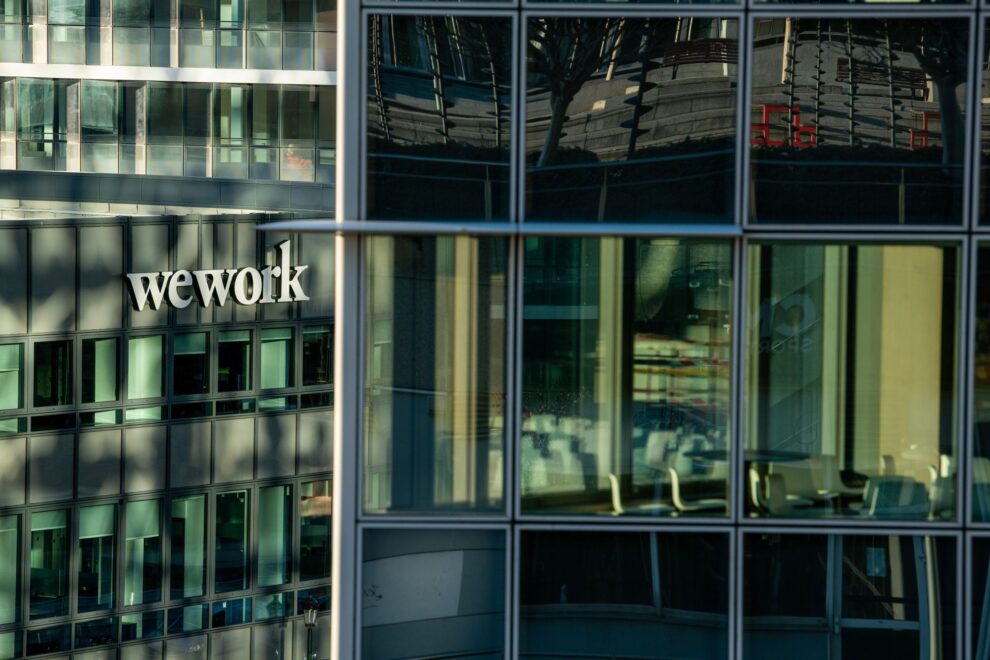
(Bloomberg Opinion) — The concept of “work from anywhere” isn’t just a 2020 phenomenon. It really is the future of office work, and 5G may play a pivotal role — or at least that’s what Verizon Communications Inc. and WeWork Cos. are betting.
Laptop-toting typists who haven’t seen their offices much since March are wondering when — or if — they’ll return full time in the new year. Most don’t want to, even if Covid-19 vaccines remove any health and safety concerns. In a Pew Research Center survey of U.S. adults whose job responsibilities can largely be handled remotely, 54% said they’d prefer to work from home all or most of the time, and a third said they would at least some of the time. Only 11% weren’t enticed by the idea.
Employers hear them loud and clear. Flexible work arrangements are likely to persist after the pandemic for a variety of reasons, including saving companies money, helping them attract top job candidates and reinforcing business continuity plans that were suddenly stress-tested to the extreme this year.
Tech companies such as Facebook Inc. and Slack Technologies Inc. made a splash when they announced longer-term work-from-home options for employees, and in some cases permanent directives. It was hard to know whether they were just outliers. But as a provider of internet and data services to businesses, Verizon has a window into how CEOs broadly are thinking and where they’re planning to spend corporate resources. Its assessment is that companies are prioritizing flexibility. And so as wireless carriers begin turning on faster 5G connections intended for consumers on the go, Verizon is simultaneously making a big push with indoor 5G for businesses.
Verizon announced Thursday that it’s working with Corning Inc., a maker of fiber-optic cable products, to install indoor cell sites — little boxes that contain antennae to transmit data on Verizon’s millimeter airwaves. WeWork, the provider of co-working office space, is one of their first customers, signing on for 10 locations. Millimeter wave spectrum can provide the fastest connections, but it can’t travel long distances or penetrate walls very well. It’s why all those cell sites are needed, and offices won’t want the bulky kind being used outdoors. (It’s also why some analysts have been critical of Verizon’s focus on millimeter waves for consumer wireless use.)
The idea is to set up private mini-cloud networks with dedicated spectrum so that connection speeds stay consistent. Sampath Sowmyanarayan, who leads the global enterprise unit of Verizon Business Group, calls it “Wi-Fi on steroids.” Speeds can be crucial for job functions where even 10 milliseconds of latency — slowness caused by a signal having to make a round-trip to and from a cloud server potentially hundreds of miles away — can be problematic. Think financial trading or package sorting by warehouse robots. But it’s not just about speed. Businesses also look to the security offered by 5G. Verizon envisions a worker being able to walk into a flexible workspace and quickly log on without going through multiple levels of authentication.
It’s not that we’ll all be working from home — or sneaking off to our parents’ Florida retirement homes — all of the time. Starting next year, though, employees may start seeing hybrid models take shape that entail some combination of regular offices, satellite and shared workspaces and home. Some people do thrive more in office settings but may have a long commute they’d prefer not to do every day. Flexible workspace in so-called bedroom communities could gain traction. Nielsen Holdings Plc, the TV-ratings company, plans to use its offices for weekly team meetings and let employees stay home the rest of the time.
The introduction of 5G hasn’t been all that earth-shattering for everyday smartphone users, but more work flexibility could be an unforeseen benefit. “Most technologies were made for the consumer, and enterprise came along for the ride,” Sowmyanarayan said. “5G was made for the enterprise, and the consumer is going to come along for the ride.” Maybe that ride is to a WeWork-type building.
This column does not necessarily reflect the opinion of the editorial board or Bloomberg LP and its owners.
Tara Lachapelle is a Bloomberg Opinion columnist covering the business of entertainment and telecommunications, as well as broader deals. She previously wrote an M&A column for Bloomberg News.
For more articles like this, please visit us at bloomberg.com/opinion
Subscribe now to stay ahead with the most trusted business news source.
©2020 Bloomberg L.P.






